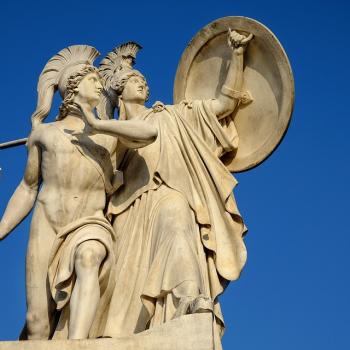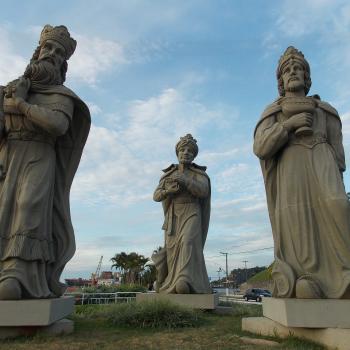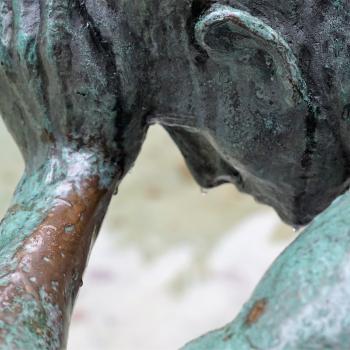The brouhaha began because people wanted to understand, they wanted to explain, they wanted to feel comfortable with mystery. Perfectly understandable.
When I teach church history courses, I try to help us all appreciate the value that heretics bring to the table. [Don’t unsubscribe just yet…hang with me.]
None of our early thinkers planned to be a heretic, scheming and wringing hands in evil glee at the prospect of skewing truth and making a mess of good Christian doctrine. Early church heretics merely asked good questions, hard questions, and when the Church had not voiced a well-considered answer, they came up with their own answers. Perfectly reasonable behavior, I think. So heretics actually help the Church—they push the Church to think more deeply, pray more fervently, study more thoroughly, and hopefully to articulate more clearly what it really believes and why.
One historian (Malcolm Lambert) put it this way: “It takes two to create a heresy; the heretic, with his dissident beliefs and practices; and the Church, to condemn his views and to define what is orthodox doctrine.”
One of first, and most influential, “heresies” to come along that furthered the Trinitarian conversation is called “modalism.” It was associated with a couple of 3rd-century writers by the name of Paul of Samosata and Sabellius. It is also sometimes called Sabellianism—poor guy got a heresy named after him. Modalism, however, is easier to remember, because basically this explanation of the Trinity says that since God is One (and we all agree about that), the Threeness must be merely aspects of the Oneness—modes of God’s being. So sometimes God presents himself to us as Father, sometimes as Son, sometimes as Spirit—like masks that God wears in his different personas.
I admit I have a soft spot for this heresy. It’s just so simple and handy, so easy to understand, so tidy.
The problem, of course, is that it isn’t true—it isn’t true to the ways scripture talks about Father, Son, and Holy Spirit. Who was Jesus praying to? Himself? Who descended on the baptized Christ? Who was the other Helper Jesus talked about? Whose voice called Jesus his Beloved on the Mount of Transfiguration? Was that all just for show?
No, there is something else going on, and this “appearance” explanation is not going to cut it.
But all through the 4th century, the specter of “modalism” drives the discussion. Anything that came close was in the danger zone. In the scramble to avoid any modalistic tendencies, other heresies arose.
There were so many other possibilities.
Another key thinker, who provoked one of the largest crises in Christian theology, was an Egyptian churchman called Arius (c. 256-336). We’ll have a lot to say about Arius, but perhaps we can just say right now that he rocked the boat in enormous ways, and that therefore the calming of the storm that he had created is equally momentous in Christian history. Big heresies provoke big orthodoxies. At one point, the Arians (followers of Arius’ way of thinking) dominated the Christian world. What we call orthodox thinking was in the minority.
I love the way Alister McGrath talks about it in his fascinating book, Heresy: A History of Defending the Truth. He addresses the ways that in the contemporary world, “heresy” has some crazy allure; our culture thinks of heresy as “radical and innovative, whereas orthodoxy is pedestrian and reactionary.” Part of this is due to the touting of the gnostic gospels—alternative versions of the gospel story—like the Gospel of Thomas and the Secret Book of John, and other spicy titles. McGrath calls this a love affair with heresy, and, really, a vote for the underdog. We have heard all too often that “history is written by the winners,” and therefore, since the Church silenced all the other versions, we can only define orthodoxy as the version that prevailed, not the version that is necessarily true. Heresy then becomes “the ideology of a defeated or oppressed group, whereas orthodoxy is the ideology of the ruling class.” And we do hate those nasty elitist bullies.
McGrath argues that, on the contrary, every heresy that has ever wormed its way into Christian discourse is a reduction of the great gospel. Every heresy is a human management system trying to pin Christian faith and practice down in ways that lessens the grace, boxes God in, closes the possibilities, controls faith, reduces the glory and mystery and power of who God is, what God has done, and where God is taking us. Orthodoxy is far more liberating—bigger, grander, deeper, and richer—than any heresy.
So we throw out modalism, in part because it isn’t true, but in part because it reduced the mystery of God in ways that were not congruent with the Church’s experience of Christ among them. And we will do the same with Arianism, but not without a long, protracted, imperial struggle involving emperors and barbarians and bishops and mobs… just like an HBO mini-series.
Photo: Steve Sawyer, Flickr C.C.
___________________________
Note to Reader: This series on Trinitarian Spirituality explores the history and spirituality behind the shaping of the Nicene Creed using Khaled Anatolios’ Retrieving Nicaea: The Development and Meaning of Trinitarian Doctrine (Grand Rapids, MI: Baker Academic, 2011) as guide and inspiration. It’s best to begin at the beginning: An Introduction.












